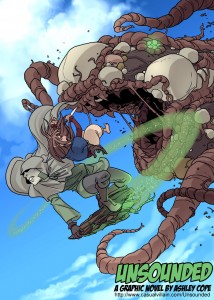My Ears Are Filled With Hate
The most important criticism you will ever receive as a writer is the one that you can’t ever answer cleanly. It’s these criticisms that will ultimately make you choose what’s important to you as a writer and if that’s more important to you than the reader (or some readers, anyway).
The thing is, because these criticisms don’t have clean answers, you’re never going to be able to totally dismiss them. They’re going to keep coming back, with each new criticism, and you’re going to find yourself asking yourself if you did the right thing all the time.
Mine?
I have a few, but one of the biggest ones I have a problem defending myself against is the fact that I have a lot of banter in my combat scenes. My characters often pause in the middle of battle for a little repartee, toss a few taunts at their enemy or offer up the occasional plea for mercy.
The criticism against this is fairly hard to defend myself against. It’s unrealistic (debatable; as my friend M.D. Lachlan pointed out to me, Muhammad Ali was famous for taunting his opponents during fights), it’s decidedly reminiscent of an action movie (and it’s true, I do occasionally employ one-liners), and it diminishes or otherwise breaks the tension of a life-or-death fight (and that part is definitely true; we could, of course, debate that gallows humor and joking during tense situations gives the reader a moment to breathe and makes the tragedy have more of an impact, but the point remains that it’s hard to take a death threat seriously when you meet it with a joke).
Sometimes, I ask myself why I do it.
And then, sometimes, I read a book that tells me exactly why.
Because I fucking love it.
I won’t name the book in question, because it’s largely irrelevant and I’m still enjoying it, overall, but I will say that it is the kind of book where the dialogue is about as exciting as two cardboard cutouts of Hugh Grant reading the obituaries of a small town in West Denmark to each other at library level.
Now, granted, that doesn’t suggest incompetence. Far from it, the dialogue is functional. Like everything else in the book is functional. The cloaks are big, the fights are brief and the dialogue is used sparsely and to do nothing more than exchange information. I know precisely what is going on in the story and precisely what happened in the backstory (which is appropriately epic for epic fantasy, after all), because that’s all these people talk about.
It’s clean. It’s neat. It’s 100% functional.
And it is terribly, terribly boring because it terribly, terribly misses the point of dialogue.
Dialogue is messy. Dialogue stutters, stumbles, backtracks and doesn’t always make sense. People are not 100% clear and functional when they talk. They don’t always talk about the situation at hand; oftentimes, they talk to avoid talking about the situation at hand. People are sloppy when they talk, they have trouble expressing themselves when it’s appropriate and no trouble doing so when it’s inappropriate. They talk to get people to admit something, they talk to avoid talking about things they hate, they talk to test their own courage and sometimes they back down.
We use dialogue to dance around a topic, to let the reader inform him or herself as to what’s important to the character, rather than to take him by the back of his head, shove his head between the double-quotes and scream “HERE. HERE IS WHAT IS IMPORTANT. THIS IS AN IMPORTANT PLOT POINT. IT IS IMPORTANT BECAUSE REASONS. MOVING ON.”
We learn a character through their dialogue not by what they say, but by how they say it. The importance is in the expression, not the information. The information is important, assuredly, but not as important as how the character reacts to it. Knowing that the demon wars of aught-six claimed a billion lives is not as important as knowing that Johnny Boyhero has trouble talking about it because he still has nightmares of seeing his mother eaten by Lord Doomjaw III.
Dialogue can’t be segregate from the story. Would you tell the story about a boy who got a sword and slew a dragon as “there was a boy who got a sword and slew a dragon, the end?” Probably not. You’d want tension. You’d want atmosphere. You’d want to know why this boy got this sword to slay this dragon and how that all came to be and you’d want it reflected in the prose. In this, dialogue is much like a story within a story. A good conversation will suggest to us all of that (why this person is talking to this person and how they feel about each other) without telling us all of that, outright.
And the word “suggestion” is key. Suggestion keeps the reader involved, it lets the reader become invested because the reader is engaged. If you just tell them, then they already know, so why would they keep reading?
You’ll note, in movies, that actors will tell you everything you need to know with just a facial expression or body language. A man sitting slightly more upright in a chair when another man walks into the room will tell us everything we need to know about their relationship. A woman who reaches out to another woman, holds her hand over her shoulder for just a moment, then withdraws it will tell us infinitely more than, say, the phrase: “I want to tell her, but I just can’t.”
This may sound like I’m contradicting myself slightly, but in writing we don’t always have the luxury of describing facial cues or body language so easily (these can be pretty easy to miss). When you can do them and do them well, then they should always take precedence. But when you must use dialogue, you must use it to tell as much about the character without telling us about the character. If a woman is confident and proud in her speech, yet stutters in front of someone else, we know what there is between them. If a man is short and terse with his wife, their entire relationship is suggested to us.
If we say “she always found herself falling all over herself when this other person was around” or “he was always short with her since he found out about the other man, even though they had left that behind,” then a level of engagement has been stripped away from the reader.
So, to bring it all back. Is it a tad impractical to have my characters banter with each other during battles? Sure. Does it make slightly less like a fight to the death and more like a movie? Maybe. But is it bad?
To me, no. It tells us something about the characters, these characters who are routinely in battle, these characters who have been forced to look at life and death a certain way, these characters who struggle to cope with the things they’ve done and will have to do when they stop talking and start stabbing.
A lot of readers got what I was going for there. That’s awesome.
Some readers didn’t. That’s okay, too. I’m not an author who blames a reader for not getting what I throw down. Their own interpretation is just that.
And, in time, I will have to question myself on that again, question if I’ve gone too far with this banter of if it will rob too much tension if Lenk makes a joke when he’s being held out over a flaming pit by the throat, blood in his eyes and mouth full of broken teeth.
But, for now, I like it.
Because I hate Hugh Grant.
My Ears Are Filled With Hate Read More »

